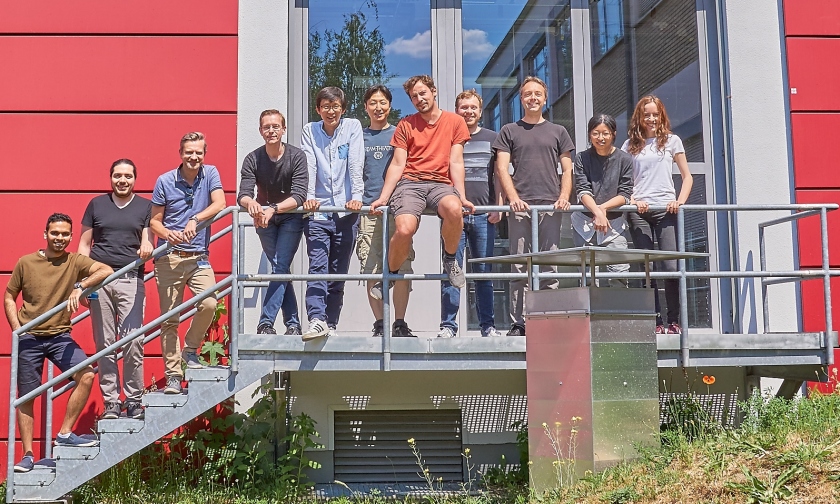Collaboration between HZB and the University of Freiburg

The theory group with Joe Dzubiella. © HZB
Through a Joint Research Group entitled “Simulation of Energy Materials“ Prof. Joachim Dzubiella of the Albert-Ludwigs-Universität, Freiburg will be able to continue his collaboration with the HZB. The theoretical physicist headed the “Theory and Simulation“ group at the HZB until recently and worked closely together with colleagues conducting experimental research. The new research group will concentrate on electrochemical energy storage and solar fuels.
From 2010 until spring 2018, Joachim Dzubiella was a scientist at HZB carrying on research and building up his theory group. He appreciated the short paths to experimentalists and worked closely with them. In 2015 he received a Consolidator Grant from the European Research Council that enabled him to further expand his group.
The physicist accepted a W3 professorship in Applied Theoretical Physics at the University of Freiburg In April 2018. But the collaboration with the HZB will continue. This has been made possible now through a Joint Research Group entitled "Simulation of Energy Materials" funded by the Helmholtz-Zentrum Berlin and the University of Freiburg.
“In the field of solar fuels, there is great interest in more clearly understanding the processes taking place at the catalyst layers that facilitate the splitting of water“, explains Dzubiella. There are also numerous aspects of electrochemical energy storage that can be analysed significantly better through modelling. The Joint Research Group currently consists of seven researchers. The focus is on what happens at the interfaces between liquid and solid phases, which are simulated by theorists with computer models in order to track down the driving forces.
The group members from Freiburg and Berlin will exchange ideas with Skype meetings, visits, and retreats in the countryside. Initial funding has been secured for five years.
More Information: http://helmholtz-berlin.de/forschung/oe/ee/simulation/
arö
https://www.helmholtz-berlin.de/pubbin/news_seite?nid=14948;sprache=en
- Copy link
-
Battery research with the HZB X-ray microscope
New cathode materials are being developed to further increase the capacity of lithium batteries. Multilayer lithium-rich transition metal oxides (LRTMOs) offer particularly high energy density. However, their capacity decreases with each charging cycle due to structural and chemical changes. Using X-ray methods at BESSY II, teams from several Chinese research institutions have now investigated these changes for the first time with highest precision: at the unique X-ray microscope, they were able to observe morphological and structural developments on the nanometre scale and also clarify chemical changes.
-
BESSY II: New procedure for better thermoplastics
Bio-based thermoplastics are produced from renewable organic materials and can be recycled after use. Their resilience can be improved by blending bio-based thermoplastics with other thermoplastics. However, the interface between the materials in these blends sometimes requires enhancement to achieve optimal properties. A team from the Eindhoven University of Technology in the Netherlands has now investigated at BESSY II how a new process enables thermoplastic blends with a high interfacial strength to be made from two base materials: Images taken at the new nano station of the IRIS beamline showed that nanocrystalline layers form during the process, which increase material performance.
-
Hydrogen: Breakthrough in alkaline membrane electrolysers
A team from the Technical University of Berlin, HZB, IMTEK (University of Freiburg) and Siemens Energy has developed a highly efficient alkaline membrane electrolyser that approaches the performance of established PEM electrolysers. What makes this achievement remarkable is the use of inexpensive nickel compounds for the anode catalyst, replacing costly and rare iridium. At BESSY II, the team was able to elucidate the catalytic processes in detail using operando measurements, and a theory team (USA, Singapore) provided a consistent molecular description. In Freiburg, prototype cells were built using a new coating process and tested in operation. The results have been published in the prestigious journal Nature Catalysis.
